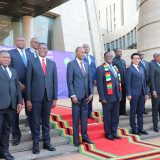According to his attorney, a Nigerian student has appeared before an Abuja criminal court on allegations of defaming the wife of the president of state over a tweet that was considered disrespectful to her.
Aminu Adamu, who was born in 1998 and is a student at the Federal University of Dutse in northern Nigeria, was detained on November 18 and transferred to Abuja, according to court records consulted by AFP, five months after posting the message in which he made comments about the First Lady, Aisha Buhari,’s appearance and criticised her for “eating the money of the poor.”
Following the filing of a complaint by President Muhammadu Buhari’s wife, a preliminary police investigation led to his arrest, which Amnesty International strongly condemned.
The young man “was brought before a Federal Capital Territory (FCT) Magistrate’s Court on Tuesday,” his lawyer Chijioke Agu told AFP by telephone. “The charge is defamation,” he said.
Mr. Adamu could spend up to two years in prison in Nigeria, according to the criminal code.
Agu stated that the hearing had been postponed till January 30 and that he had requested bail on behalf of his client, who was being held in the Suleja jail north-west of Abuja.
The student admitted sending the offensive tweet, which featured a picture of Mrs. Buhari and a statement in Hausa, the most common language in northern Nigeria, according to court documents obtained by AFP.
Amnesty International said in a statement that Adamu’s family and relatives said he had been “subjected to beatings, torture, and other ill-treatment.
Amnesty International also criticized the “illegal arrest” and demanded the man’s “immediate” and “unconditional” release.
On Thursday, one of Nigeria’s largest student organizations (Nans) issued a demand for statewide protests in Mr. Adamu’s favour on the following Monday. According to Nans, “Our protests must go on until his unconditional release.”
Buhari is required by the constitution to step down from office in 2023 after two terms as president of Nigeria. Human rights groups have become more vocal in recent years in their criticism of the government, which they accuse of repeatedly attempting to restrict freedom of speech and opinion.
A lot of critics and journalists have been detained, protests have been brutally put down, and Twitter was blocked for seven months in 2021.





